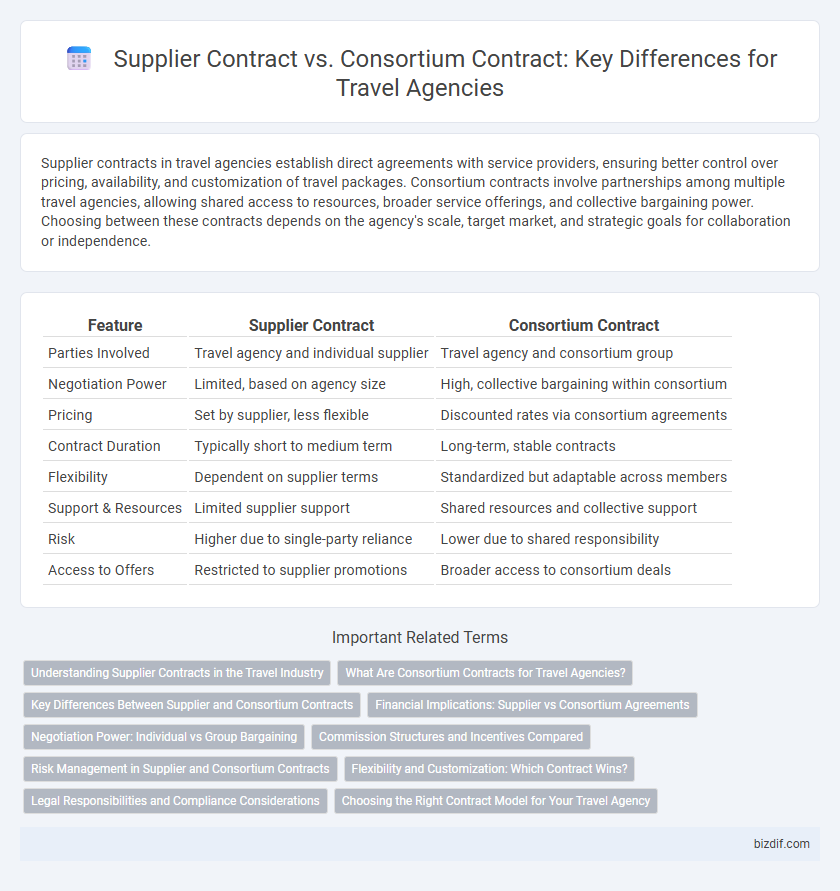Supplier contracts in travel agencies establish direct agreements with service providers, ensuring better control over pricing, availability, and customization of travel packages. Consortium contracts involve partnerships among multiple travel agencies, allowing shared access to resources, broader service offerings, and collective bargaining power. Choosing between these contracts depends on the agency's scale, target market, and strategic goals for collaboration or independence.
Table of Comparison
| Feature | Supplier Contract | Consortium Contract |
|---|---|---|
| Parties Involved | Travel agency and individual supplier | Travel agency and consortium group |
| Negotiation Power | Limited, based on agency size | High, collective bargaining within consortium |
| Pricing | Set by supplier, less flexible | Discounted rates via consortium agreements |
| Contract Duration | Typically short to medium term | Long-term, stable contracts |
| Flexibility | Dependent on supplier terms | Standardized but adaptable across members |
| Support & Resources | Limited supplier support | Shared resources and collective support |
| Risk | Higher due to single-party reliance | Lower due to shared responsibility |
| Access to Offers | Restricted to supplier promotions | Broader access to consortium deals |
Understanding Supplier Contracts in the Travel Industry
Supplier contracts in the travel industry define specific terms and obligations between travel agencies and service providers such as hotels, airlines, and tour operators, ensuring the delivery of agreed-upon services at negotiated rates. These contracts typically include clauses on pricing, cancellation policies, and liability, which help agencies manage risks and maintain service quality. Understanding the details of supplier contracts is crucial for travel agencies to secure competitive offers and uphold customer satisfaction.
What Are Consortium Contracts for Travel Agencies?
Consortium contracts for travel agencies involve collaborative agreements where multiple agencies combine resources to access better rates, shared marketing, and consolidated supplier relationships. These contracts enable member agencies to leverage collective bargaining power with airlines, hotels, and tour operators, resulting in enhanced service offerings and competitive pricing. By participating in a consortium, travel agencies can expand their product portfolio and improve operational efficiency without negotiating individual supplier contracts.
Key Differences Between Supplier and Consortium Contracts
Supplier contracts in the travel industry primarily establish terms between a travel agency and individual service providers, such as hotels or airlines, focusing on direct delivery of specific services and negotiated rates. Consortium contracts involve agreements between travel agencies and a network of suppliers or other agencies, emphasizing collective bargaining power, shared marketing efforts, and access to exclusive benefits or inventory. Key differences include the scope of collaboration, with supplier contracts being bilateral and consortium contracts fostering multi-party cooperation to enhance competitive advantages and operational efficiency.
Financial Implications: Supplier vs Consortium Agreements
Supplier contracts typically involve direct payment terms, fixed rates, and negotiated commissions with individual service providers, impacting cash flow through upfront costs and variable rebates. Consortium agreements leverage collective buying power, often resulting in reduced rates, shared financial risks, and enhanced credit terms, increasing profitability via economies of scale. Understanding the distinct financial obligations and benefits in each contract type ensures optimized budgeting and cash management for travel agencies.
Negotiation Power: Individual vs Group Bargaining
Supplier contracts offer travel agencies direct negotiation power, enabling tailored terms and exclusive deals based on individual agency needs. Consortium contracts enhance group bargaining strength by pooling multiple agencies' demands, resulting in better rates and favorable conditions from suppliers. Choosing between these contract types depends on whether maximizing individual customization or leveraging collective volume is the priority.
Commission Structures and Incentives Compared
Supplier contracts in travel agencies typically offer fixed commission rates based on volume or sales targets, providing consistent incentives for booking specific products or services. Consortium contracts often feature tiered commission structures that increase with collective agency performance, encouraging collaboration and shared success among member agencies. These differentiated commission models directly impact agency revenue streams and motivate sales strategies aligned with either individual supplier loyalty or consortium-wide goals.
Risk Management in Supplier and Consortium Contracts
Supplier contracts in the travel industry often centralize risk management on individual service providers, requiring clear liability clauses and performance guarantees to mitigate potential disruptions. Consortium contracts distribute risks among multiple partners, enhancing shared accountability but necessitating detailed agreements on responsibility allocation and dispute resolution mechanisms. Effective risk management in both contract types demands rigorous due diligence, precise contract terms, and continuous monitoring to ensure compliance and minimize operational exposure.
Flexibility and Customization: Which Contract Wins?
Supplier contracts offer travel agencies greater flexibility by allowing tailored agreements with individual suppliers based on specific destination requirements and seasonal demand. Consortium contracts provide standardized terms that ensure consistent service levels but often limit customization due to collective bargaining frameworks. For agencies prioritizing adaptable, bespoke travel packages, supplier contracts typically deliver superior customization and operational agility.
Legal Responsibilities and Compliance Considerations
Supplier contracts in travel agencies typically assign direct legal responsibility for service delivery and compliance with local regulations to the individual supplier, ensuring accountability for quality and performance standards. Consortium contracts involve shared legal responsibilities among member agencies, requiring collective compliance with industry regulations and collaborative risk management practices. Agencies must carefully evaluate liability clauses and regulatory obligations within each contract type to mitigate legal risks and ensure adherence to tourism laws and consumer protection standards.
Choosing the Right Contract Model for Your Travel Agency
When selecting the ideal contract model for a travel agency, understanding the differences between supplier contracts and consortium contracts is crucial. Supplier contracts typically involve direct agreements with individual service providers, allowing for customized offerings and potentially better commission rates. Consortium contracts, on the other hand, provide access to a broader range of travel products through group agreements, enhancing competitive pricing and collaborative marketing opportunities.
Supplier contract vs Consortium contract Infographic

 bizdif.com
bizdif.com